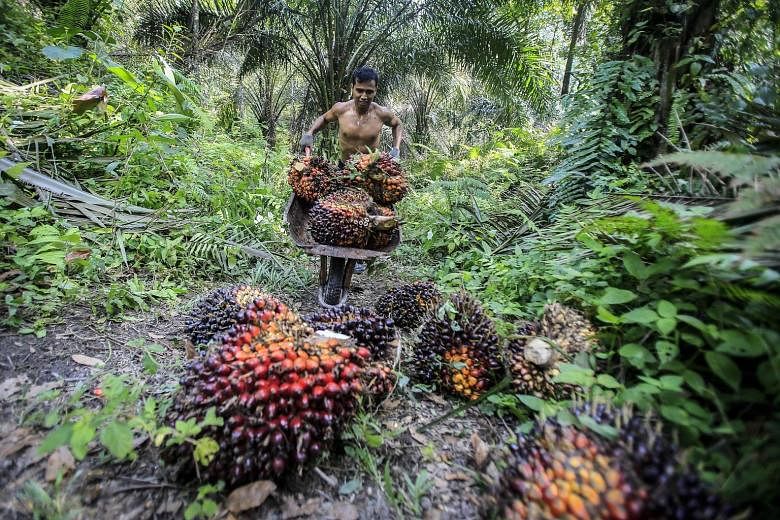Indonesia, the world's largest palm oil exporter, is ready with countermeasures if the European Union (EU) goes ahead with plans to restrict the use of palm oil in biofuels.
One option is to stop all palm oil shipments to Europe when demand from domestic and alternative overseas markets surges.
Indonesia is gearing up to require biofuels to have a higher mandatory bio-content in later years, from 20 per cent currently, which means more palm oil will be needed.
Last week, President Joko Widodo told Bloomberg he would fight any EU discrimination against palm oil as there are 16 million farmers and workers in the sector, calling it a strategic commodity for Indonesia.
The EU wants to cap palm oil's use in fuel that counts towards renewable energy targets.
It has set a 2030 deadline to phase out palm oil, even if it is certified as sustainable - meaning that its production does not harm people or the environment.
The plan has angered Indonesia and Malaysia, which account for 85 per cent of global palm oil output.
"For biofuels, they say no to palm oil because they want to give room to their sunflower farmers (who produce competing vegetable oil), but at the same time, they say go ahead to palm oil for use in foods," Dr Siswo Pramono, head of the policy analysis and development agency at Indonesia's Foreign Affairs Ministry, told The Straits Times.
Palm oil is used in goods from cosmetics to chocolate.
Thirty years ago, about 75 per cent of Indonesia's palm oil exports went to Europe.
Today, Europe takes only about 18 per cent, government data shows.
Indonesia is now raising the mandatory bio-content of palm oil in its biofuels from 20 to 30 per cent next year, and to 50 per cent (commonly referred to as B50) in later years.
"When the B50 policy is implemented, and together with the rising demand of crude palm oil in other alternative markets, we could just shift the European portion to domestic and other alternative markets," Dr Siswo said, pointing out that exports to Europe total about 5 million tonnes a year.
Maritime Affairs Coordinating Minister Luhut Pandjaitan told ST that Indonesia's list of countermeasures is set.
"We are open to all options available," he said. "If they offer a challenge, we would take it. We know it could be painful on our part, but this is about the pride of a nation.
"Millions of farmers and relevant workers would be affected. How could we not defend them?"
Indonesia would be able to mitigate the "painful impacts", Mr Luhut added, without elaborating.
More than 40 per cent of Indonesia's crude palm oil output comes from traditional farmers and smallholders. The sector helps to eradicate malnutrition and improve public health, in line with the United Nations' sustainable development goals, Dr Siswo argued.
He added that, previously, the EU required Indonesia's plantation companies and farmers to comply with standards set by the Roundtable on Sustainable Palm Oil. They then made investments to comply with them.
But after many growers got their palm oil certified as sustainable, the EU then introduced a new standard called the Indirect Land-Use Change (ILUC), Dr Siswo said.
Under the ILUC, the EU identifies whether biofuels are high risk based on whether they use unsustainable crop feedstock, especially if cultivation of the crops causes deforestation and releases greenhouse gases.
The EU plans to curb high-risk biofuels from 2021 to 2023 and phase them out by 2030.
Indonesia argues that its producers exporting palm oil to Europe comply with the EU's renewable energy directive and that oil palm plantations do not cause deforestation in Indonesia because when cultivation rights were issued, lands were no longer forest.
Often they were previously rubber plantations, open lands or other dryland farms.
The government has also reported reduced deforestation this year and is set to receive its first carbon payment from Norway, under a partnership started in 2010.
"We are not a banana republic," Mr Luhut said. "We understand what we are doing. Our policy on the environment is we are thinking about the next generations."

